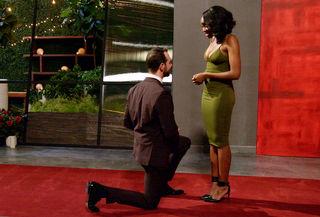Relationships
Lessons From "Love Is Blind"
5 takeaways from the hit Netflix show to apply to your own love life.
Posted February 27, 2020 Reviewed by Lybi Ma

This month, Netflix dropped original reality show Love is Blind. It bills itself as a social experiment in which 15 women and 15 men sit in tiny, connected "pods" and, fueled by drinks, get to know each other. Within 10 days, five couples (or more, actually) get engaged—without ever having seen each other. They then meet face-to-face, move into condos, meet each other's friends and family, and plan their weddings—all within the next three weeks.
Parts of the series are, unsurprisingly, problematic. For example, it's highly heteronormative, with the one bisexual participant seemingly exhibiting internalized biphobia. But in many ways, those on the show appear unabashedly eager to find a partner.
The relationships that spring up make sense personality-wise, even if they're highly sped up. Most of the couples seem to share their true feelings with each other, even if they sometimes need to talk with a physical wall in between them to mimic the safe setting of the pods.
Maybe it's for these reasons that I wish a couples therapist could sit down with the couples and work out some of the issues and erroneous assumptions that inevitably arise. (While some reality dating shows do have therapists on set, it doesn't appear to be the case here.) Many of the problems that come up on the show echo common complaints and misconceptions that I hear in my office.
To that end, here are five takeaways I'd offer to the couples—and to any clients navigating new relationships. Note: Mild spoilers ahead, though not about the finale, which comes out 2/28/20.
1. There's no such thing as love at first sight (or sound).
Let's start with the basic premise of this show. It plays into the cultural myth that we can fall in love quickly—within a conversation or two. Sure, there can be immediate attraction and intrigue, but it's just not possible to know a person on a deep emotional level within the first few minutes, hours, or days.
One reason that we think we can fall so fast is that we're often attracted to people who have similar characteristics to our earliest caregivers (i.e., parents). We sense that there's something familiar about our partner, which is what can lead to that "I feel like I've known you forever" feeling. This is a natural part of the relationship process—but it doesn't last forever.
Inevitably, there's an individuation process in which you realize your partner isn't perfect, and those similarities can start to grate on you. With the right partner (and often with professional support), this can be an amazing opportunity to work with your partner to heal your core wounds together.
2. It's your job to share your needs.
There are several points in the show where there is a confusing lack of communication. For example, participant Lauren finds herself unable to give Cameron a clear yes that she'll go through with the wedding, given her fear of giving up her independence. But instead of asking about her hesitations, Cameron just smiles and quietly becomes resentful. Castmate Kelly avoids sex with her fiancé Kenny because of her difficulties orgasming with a partner. To her credit, she does finally share this information, but the conversation ends there.
Both Lauren and Kelly would benefit from sharing their concerns with their partners. It can be scary to admit fears and vulnerabilities, especially if you don't believe the other person will understand or be willing to work with you. However, unless you're grounded and confident enough to express your needs, confusion and resentment will abound. You also deny your partner the opportunity to know you better and the chance to show their willingness to support you.
3. You get to map out your own relationship path.
Let's go back to Lauren and Cameron for a moment. Cameron expects Lauren to move into his house once they're married, but Lauren is loath to give up her apartment, which she works out of and has made into her own sacred space. She brings up the idea of keeping her apartment, and Cameron appears unhappy with that idea. In this case, a couple's therapist might explore Lauren's fear of losing her independence, as well as Cameron's need to bring Lauren into his space (instead of them finding a new home together).
But he/she/they might also question the wider assumptions of living together. According to the U.S. Census Bureau, four million married couples live apart—and most of those are in their 20s and 30s. This number includes Gwyneth Paltrow, who spends half the week living apart from her husband. This is not to say that Lauren and Cameron need to live apart. But it's important for them to question what they want their relationship to look like, regardless of what they assume everyone else is doing.
4. Don't compare yourself with other couples.
On the show, Jessica feels insecure about her relationship with Mark after seeing the other couples kiss and cuddle in front of her. But she hasn't seen the video footage of Giannina and Damian's knock-down, drag-out fights, or of Kelly admitting that she's not actually sexually attracted to Kenny.
The truth is that humans are imperfect; thus, relationships are imperfect. But our culture and media (especially social media) often sell the false idea of an effortless "happily ever after." Relationships can be wonderful, exciting, and healing, but it takes active and consistent effort from both partners to make this happen.
5. Take care of yourself first.
Several of the castmates mention feeling depressed or lost before coming on the show. They attribute it to "being alone" and seem enthused that their new partner has made these emotions disappear. The fact of the matter is that even if their new partnerships last, these feelings of depression or loneliness will come up again—and it will affect their relationships.
The good news is that whether or not you have partners, you can take steps to work on yourself now. (I mention some ways to do this in a previous article.) Focusing on your own happiness and health will have incredible benefits for your relationships with others, both now and in the future.
I'm curious to hear your thoughts about Love Is Blind. Do you have any reflections about the show or relationships in general? Please share in the comments below!




